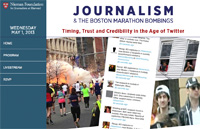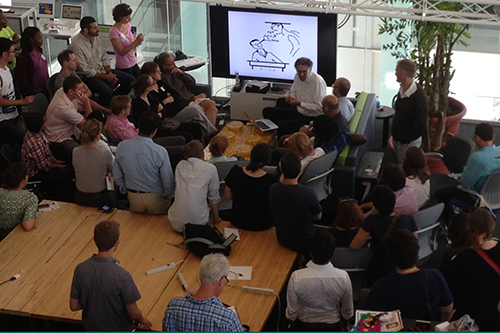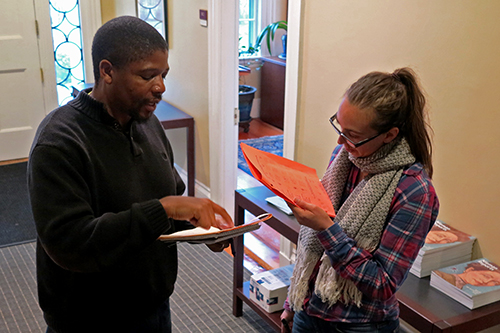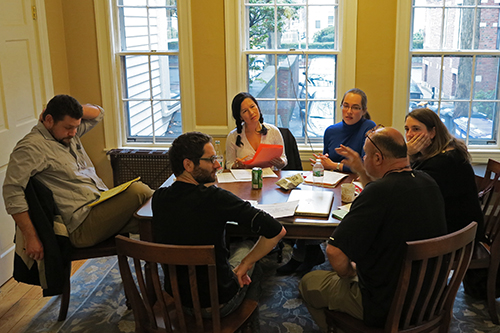The Year in Review
For the fellows and staff at the Nieman Foundation, each year brings an intricate mix of hard work and reflection, cherished traditions and welcome innovations, joys and sorrow. Events in 2013 were no exception, with some exceptional highs and lows.
The highlight of the past 12 months was Nieman’s
75th anniversary weekend in September, a gathering of more than 400 alumni and guests who experienced once again all the magic that is Nieman. The reunion celebration reminded all what it means to be part of the Nieman community and as
Nieman Curator Ann Marie Lipinski writes, also “challenged us all to think expansively about our journalism in this time of great disruption.”
At the opposite end of the spectrum was the startling violence that struck so close to home – the bombings at the Boston Marathon in April. For
Boston Globe reporter and 2013 Nieman Fellow
David Abel, the joyous mood at the finish line was shattered in a matter of seconds. Abel was at the scene filming a documentary for a Harvard class when the two explosions forever changed the lives of the victims and
his own reporting. Having to walk a fine line between eyewitness and journalist, David quickly jumped into action and started reporting and doing interviews with news outlets around the world. His Nieman classmates also scrambled to the scene to report for their own newsrooms, sending dispatches to
Paris, Madrid, Jerusalem and beyond.
As disturbing as the news was, it also provided an important learning moment. The foundation quickly assembled a panel of key players to analyze the role of social media in the coverage of the event.


The resulting webcast,
Journalism and the Boston Marathon Bombings: Timing, Trust, and Credibility in the Age of Twitter, and the
package of stories produced for Nieman Reports demonstrated that in an age of crowdsourced reporting, professional journalists are needed more than ever as are the tools for verifying and integrating the community's contributions. Nieman Visiting Fellow
Hong Qu, who was developing his
Keepr app to track credible information from live Twitter feeds, posted two pieces for Nieman Reports during the search for the bombing suspects:
Twitter, Credibility and The Watertown Manhunt and
Social Media and the Boston Bombings.
The Boston Marathon panel was just one of several public events hosted by the Nieman Foundation to provide the journalism community with fresh ways of looking at changes in the news industry, storytelling in the digital space and newsroom best practices. At the end of February, Nieman curator
Ann Marie Lipinski moderated
Be the Disruptor, a webcast with Harvard Business School Professor
Clayton M. Christensen and 2012 Nieman Fellow
David Skok. The event followed their groundbreaking Nieman Reports article “
Breaking News,” about disruptive innovation in the journalism industry and ways news executives can implement change for long-term growth and survival.
In May, the foundation organized
National Narratives, Local Stories: How Latinos are seen and heard in America, a panel discussion with
Maria Hinojosa, anchor of NPR’s “Latino USA” program;
Isaac Lee, president of news for Univision; and 2013 Nieman Fellow
Laura Wides-Muñoz, Hispanic affairs writer for The Associated Press. The group evaluated coverage of the Latino community in the United States and the increasingly important role Latinos are playing in politics and in the nation’s broader public discourse. Laura also helped organize a three-day workshop in October,
Covering Immigration: The Story behind the Politics, Economics and U.S. Law, which was hosted by the Nieman foundation with support from the MacArthur Foundation.

From left, Kathleen Carroll, Diana Eck, Noam Chomsky and Lawrence Lessig
Seen and heard at Lippmann
Throughout the year, fellows, local alumni, journalists and members of the Harvard community heard from seminar speakers who shared their expertise on a wide variety of subjects ranging from the global economy to mother’s milk.
The long roster of guests included
Mahzarin Banaji, Harvard professor of psychology and an expert on how unconscious biases guide every aspect of our lives; the legendary
Noam Chomsky, author, political commentator, media critic and professor emeritus in the linguistics department at MIT; professor of economics
Raj Chetty, a MacArthur Genius Grant recipient who received tenure at Harvard at the tender age of 29;
Diana Eck, Harvard professor of comparative religion and Indian studies and a long-time Nieman supporter;
Kathleen Carroll, executive editor and senior vice president for The Associated Press;
Michael Puett, Harvard professor of Chinese history;
Jorge Dominguez, vice provost for international affairs at Harvard and one of the world’s leading experts on Latin America;
Ellen Langer, professor of psychology and pioneer in the field of mind body research, who spoke about mindfulness as a tool for stress reduction and good health; and
Lawrence Lessig, Roy L Furman Professor of Law and director of the Edmund J. Safra Center for Ethics, who discussed
corruption, campaign finance and Aaron Swartz.
Dr. Frank Ochberg, founder of the Dart Center for Journalism and Trauma, led a session on the impact of traumatic experiences and what that means for journalists who have experienced trauma on the job.
Other speakers included
Katie Hinde, a Harvard human evolutionary biologist and blogger at
mammalssuck.blogspot.com, who studies and expounds on the importance of mother’s milk. Hinde also
spoke at Nieman’s 75th anniversary in September. In the fall, Professor
James Robinson spoke about his book “Why Nations Fail”;
Erik Martin, general manager of Reddit, talked about
building communities and breaking news during a session moderated by Nieman Journalism Lab staff writer
Justin Ellis;
Thomas Kelly, the Morton B. Knafel Professor of Music at Harvard, teacher of the always-popular First Nights course, led the fellows in a Gregorian chant;
David Finkel,
Washington Post staff writer and a 2012 MacArthur Fellow, discussed his writing and his new book "Thank you for Your Service," about life after war;
Andrew Fitzgerald, head of news partnerships at Twitter, spoke on the importance of Twitter for journalists on the eve of the company's IPO; and filmmaker
Errol Morris discussed
speaking power to truth and his profiles of controversial public figures including Donald Rumsfeld, the subject of his latest film. To round out the year, South African political scientist and a leading public intellectual
Achille Mbembe visited Lippmann House on the day before
Nelson Mandela’s death in December.
Fellows also went on the road to meet with speakers in their own work environment. The class of 2013 visited poet
Sharon Olds at her home in New Hampshire while 2014 fellows took a field trip to speak with Frontline's executive producer
David Fanning and deputy executive producer
Raney Aronson at WGBH’s studios. They also attended the American Repertory Theater’s presentation of “All the Way” staring
Bryan Cranston as Lyndon Johnson. And they met with playwright
Robert Schenkkan and director
Bill Rauch during an evening reception. In November, Harvard Business School Dean
Nitin Nohria welcomed the class to his campus for a conversation about leadership, innovation, and journalism, with Nieman curator
Ann Marie Lipinski.

From left, Achille Mbembe, Andrew Fitzgerald, Katie Hinde and David Finkel

The 2014 Nieman Fellows visit the MIT Media Lab during orientation
Learning from fellow journalists
In addition to the many seminars at Lippmann House, Nieman also offered a series of shoptalks with leading media voices.
Susan Crawford, a professor at Cardozo Law School and a member of Mayor Michael Bloomberg’s Advisory Council on Technology and Innovation, discussed intellectual property, communications law and privacy.
Jenna Wortham and
Brian Stelter, two writers for
The New York Times – one covering technology, the other media — talked about the trends they’re watching in digital media and at their own newspaper. Stelter has since left the
Times for CNN. In April,
Alberto Cairo, a lecturer at the University of Miami and an information graphics specialist, explained how to use data visualization effectively and award-winning author
Junot Díaz, professor of writing at MIT, spoke to a standing-room only crowd about his craft. Also in April
Clark Gilbert, president and CEO of the Deseret News Publishing Company and Deseret Digital Media,
explained how he used disruption methodology to infuse new life into the 162-year-old
Deseret News, Utah’s oldest continually published newspaper, and local radio and television station KSL.
Fellows also heard from
Felix Salmon, blogging editor for Reuters.
Tina Brown, editor-in-chief of The Daily Beast and former editor of
The New Yorker, also visited for an intimate, off-the-record discussion about online journalism, opinion shaping and her
Women in the World Summit, which highlights the role of women across the world. Video journalist
Bryan Rich, NF ’98, and NPR’s
Deborah Amos, NF ’92, also came for a conversation about the many challenges journalists face when covering events in Syria. In the fall, Romanian novelist and poet Mircea Cartarescu talked about his work and
the consequences of speaking out in modern Romania.
Fellows additionally gained new skills in master classes with leading journalists and academics including
Al Shaw, news applications developer at ProPublica, who taught ta session on programming for journalists. Kennedy School lecturer and Nieman Board member
Nicco Mele also returned to Nieman for a three-part crash course on “Media, Politics and Power” and
Brian Mandell, senior lecturer in public policy and director of the Kennedy School Negotiation Project led a one-day negotiation workshop tailored for the fellows. In December,
Stephen Engelberg, managing editor at ProPublica, joined 2014 Nieman fellow and NPR’s counterterrorism correspondent
Dina Temple-Raston in conversation about nonprofit investigative reporting.
Other invited guests who came to talk were Pulitzer Prize-winning journalist
Ron Suskind; Harvard Business School professor and Nieman Board member
Joseph Bower, who discussed his book “Capitalism at Risk”; novelist, journalist and veteran war correspondent
Scott Anderson, author of “Lawrence in Arabia,” his latest book; and
Dele Olojede the first person born in Africa to win a Pulitzer Prize, who won for reporting in Rwanda for
Newsday in 2005. He spoke about his new project, an online news/investigative journalism venture in his native Nigeria.

From left, Ron Suskind, Brian Mandell, Junot Díaz and Tina Brown


2014 Nieman Fellows and Affiliates work together during a negotiation workshop led by Harvard Kennedy School lecturer Brian Mandell
Outreach and Partnerships
Throughout the year, the Nieman Foundation also presented a series of
annual journalism awards, hosted two major conferences:
Covering Immigration: The Story behind the Politics, Economics and U.S. Law and the
Georges Conference on College Journalism.
The foundation also continued to co-sponsor events with partners on campus including the
Herbert C. Kelman Seminar on International Conflict Analysis and Resolution at the Weatherhead Center for International Affairs; the
Harvard Writers at Work lecture series, a talk by NPR’s
Melissa Block talk at the Radcliffe Institute, introduced by Ann Marie Lipinski; and the
Humanity Explored series, which took a look at human rights issues through the lens of visual storytelling.
Curator
Ann Marie Lipinski worked with senior vice provost
Judith Singer to organize a faculty-wide workshop on the art of writing op-eds and perspective pieces for non-academic media. The session, which she moderated, included widely published Harvard professors Edward Glaeser and Caroline Elkins,
New York Times op-ed editor Trish Hall and
Boston Globe Ideas section editor Amanda Katz, and attracted a wide cross section of Harvard faculty.
Lippmann House also opened its doors to events organized by the
Maynard Media Academy and
Hacks/Hackers.
In Memoriam
As 2013 comes to a close we remember those we lost in the Nieman community during the past year including Grady Clay, NF ’49; Murrey Marder, NF ’50; Anthony Lewis, NF ’57; Stanley Karnow, NF ’58; Robert Clark, NF ’61; Shelby Scates, NF ’63; Larry King, NF ’70; Benjamin G. Defensor NF ’72; Thomas Dolan, NF ’75; and Kirsty Milne, NF ’04.